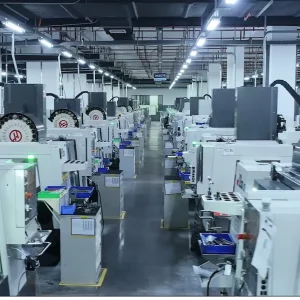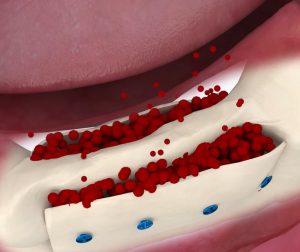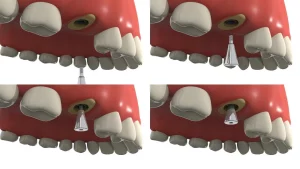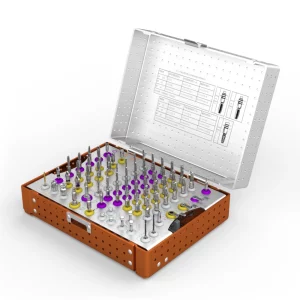Dental implants are often considered a preferred solution for individuals dealing with tooth loss, as they not only restore the complete structure of the mouth but also maintain a long-lasting, natural appearance. Additionally, people with certain dental issues tend to opt for implants as a solution. The procedure involves a delicate minor surgery, and while the results are excellent, careful post-operative care is essential, especially during the recovery phase.
One important aspect of post-surgical care is dietary adjustments. During the specific period following dental implant surgery, patients need to pay special attention to their eating habits, particularly to the consumption of certain foods. Notably, dairy products are often advised against during this time—but why is that? Why shouldn’t you drink milk after dental implants? Let’s explore this further.

Reasons for Avoiding Dairy After Dental Implants
The primary reasons for avoiding dairy after dental implant surgery are concerns related to infection risk, blood clotting, medication interactions, oral environment, and inflammation response. Adhering to this dietary guideline helps promote the successful healing and long-term stability of the implants.
Infection Risk Considerations:
Firstly, dairy products, especially those not properly refrigerated, can become breeding grounds for bacteria. After dental implant surgery, the mouth’s defense mechanisms are relatively weakened, and any bacterial growth could increase the risk of infection, jeopardizing the healing process of the implants. Therefore, avoiding dairy consumption is an important measure to prevent infection.
Blood Clotting and Healing Process:
Although it is recommended to avoid chewing forcefully to minimize pressure on the implant site after surgery, even soft dairy products like yogurt or ice cream could inadvertently disturb the implants and interfere with the normal blood clotting process. This is crucial during the initial stage of wound healing. Thus, temporarily avoiding dairy products helps maintain a stable oral environment conducive to bone integration.
Medication interactions and digestive issues:
After dental implant surgery, patients are typically prescribed antibiotics to prevent infection. Consuming dairy during this time can interact with certain antibiotics, reducing their efficacy or causing adverse reactions. Additionally, dairy products are harder to digest than other foods, which may increase gastrointestinal strain and indirectly impact the overall recovery process.
Oral pH Balance:
Milk and other dairy products often contain high sugar content, and these sugars ferment in the mouth to produce acidic substances, disrupting the pH balance of the oral cavity. Being in an acidic environment for a prolonged period can delay wound healing and even increase the risk of implant failure. Therefore, reducing dairy intake is a wise choice to maintain an oral environment favorable for implant healing.
Inflammation Response Regulation:
For some individuals, dairy products may trigger or exacerbate inflammation. While moderate inflammation is a natural part of the healing process, excessive inflammation can threaten the successful integration of the implant. Thus, limiting dairy intake during the sensitive postoperative period helps minimize unnecessary inflammatory responses and ensures smooth implant healing.
What Should You Avoid After Dental Implants Besides Dairy?
- Spicy and Acidic Foods: Foods like chili peppers and lemons can irritate the surgical area, intensifying discomfort and possibly slowing down the healing process. They may increase the inflammatory response, which is not conducive to implant stability.
- Crunchy and Hard Foods: Snacks like chips, nuts, hard candies, and chewy meats can put unnecessary pressure on the implant, affecting its integration with the jawbone. It’s recommended to opt for soft, easy-to-chew foods.
- Alcohol and Tobacco Products: Excessive alcohol consumption can interfere with the body’s natural healing mechanisms while smoking not only delays healing but also significantly increases the risk of infection and other complications. It’s important to limit or avoid these substances after surgery.
- Carbonated Beverages: The carbonation in these drinks may negatively affect the oral environment, disrupting the implant’s stability and increasing discomfort. It’s best to choose water or mild teas that are non-irritant.
- Sticky or residue-prone foods: Foods like pizza (especially thick crusts and toppings), rice, and popcorn can easily get lodged around the surgical site, causing irritation or infection. It’s best to avoid or carefully consume these foods during recovery.
- Chewy Candies and Sharp-Edged Foods: Chewy candies can stick to the surgical area, increasing the risk of infection, while foods with sharp edges may irritate the implant site, causing discomfort.
- Hard and Dense Bread: foods like baguettes are hard and difficult to chew, potentially putting pressure on the implant and slowing healing. Opt for softer breads or pasta instead.
Foods to Provide Nutrition Instead of Dairy
After dental implant surgery, while dairy products need to be temporarily avoided, there are several excellent alternatives to ensure adequate intake of key nutrients like calcium and protein. Here are some recommended alternatives:
- Almond Milk: As a top non-dairy choice, almond milk offers a smooth texture and is rich in calcium, making it an ideal substitute for dairy products, and suitable for daily consumption after surgery.
- Coconut Yogurt: This yogurt retains the creamy texture and rich flavor of traditional yogurt but is entirely dairy-free, offering a healthy option for yogurt lovers while satisfying taste buds and providing nutrients.
- Bone Broth: Rich in minerals, collagen, and various amino acids, bone broth is easy to digest and absorb, promoting wound healing and bone health, making it a great source of nutrition during recovery.
- Leafy Greens: Vegetables like spinach and kale are natural calcium powerhouses, rich in iron and vitamin K. They help boost immunity and support overall recovery, making them a crucial part of a balanced diet during the healing process.
What Foods Are Good to Eat After Dental Implants?
The recovery phase after dental implants is the most critical stage. If you feel confident about the products used for your teeth after surgery, it can help significantly. Some products may harm the healing process, so choosing some excellent healthy options after dental surgery can be beneficial.
Liquid Diet
In the initial stages after dental implants or surgery, you must take special care of your mouth. During this phase, blood clotting occurs, so it’s important to be mindful of it. A liquid diet is a great option during this time.
Here are some liquid diet options you can consider:
- Vegetable Juice: Incorporating vegetable juice into your daily routine boosts nutrition, supports dental implant healing, and aids in post-surgery recovery. It provides essential vitamins and minerals that help in the healing process.
- Stay Hydrated: Proper hydration is crucial for the successful recovery of dental implants, creating an optimal healing environment.
- Warm Broth (Not Hot): For optimal healing during dental implant placement and recovery, choose light broths with minimal spices. These are easy to swallow and won’t put too much pressure on the healing implant site. These should provide nourishment without interfering too much with the recovery process.
- Caffeine-Free Beverages: For optimal healing after surgery, opt for caffeine-free drinks to minimize irritation to the surgery site. Herbal teas or decaffeinated teas can be soothing beverages during recovery.
- Smoothies: Blending fruits with yogurt creates a delicious smoothie that gently promotes gum healing while meeting nutritional needs and adding variety and flavor to your diet.
- Soft Gelatin: To add extra protein during recovery, soft gelatin meals offer an easily digestible protein source that supports healing while maintaining overall nutritional balance.
When Can You Start Consuming Dairy Products Again?
- The timing for consuming dairy products after dental implants largely depends on the healing process and your doctor’s advice. Typically, after dental implants, you need to wait for a period to ensure that the surgical site is stable and healing properly.
- In most cases, it’s not recommended to eat anything, including dairy products, within the first 2-3 hours after the procedure, as the surgical site may still be bleeding or sensitive. As time passes, the bleeding will gradually stop, and the healing process will begin.
- Within 3-5 days after dental implants, patients can gradually transition back to their regular diet, but it’s important to avoid hard, hot, or irritating foods during this time to prevent unnecessary stress or damage to the surgical site. At this stage, you can start consuming dairy products in moderation, choosing options that are easy to digest and at an appropriate temperature, such as warm milk or yogurt.
- However, the exact recovery time and dietary recommendations may vary based on individual circumstances. It’s crucial to follow your doctor’s instructions closely and adjust your diet according to your personal healing process. If you experience any discomfort or have concerns during recovery, consult your doctor for further guidance.
Заключение
It is not recommended to consume dairy products immediately after dental implant placement due to infection risk, blood clotting, drug interactions, oral environment, and inflammatory response. Dairy products can breed bacteria, interfere with the blood clotting process, and interact with antibiotics. It can also disrupt the pH balance in the mouth, leading to delayed wound healing and implant failure. To avoid postoperative complications, avoid spicy and acidic foods, hard and crunchy foods, alcohol and tobacco products, carbonated beverages, sticky or sticky foods, chewy candies, and hard and dense breads.
The timing of consuming dairy products after dental implant placement depends on the healing process and the doctor’s advice. Patients should gradually resume a normal diet over 3-5 days, avoiding hard, spicy, or irritating foods. Follow your doctor’s instructions and adjust your diet to your individual circumstances.





